独立主格结构
高考:英语独立主格结构
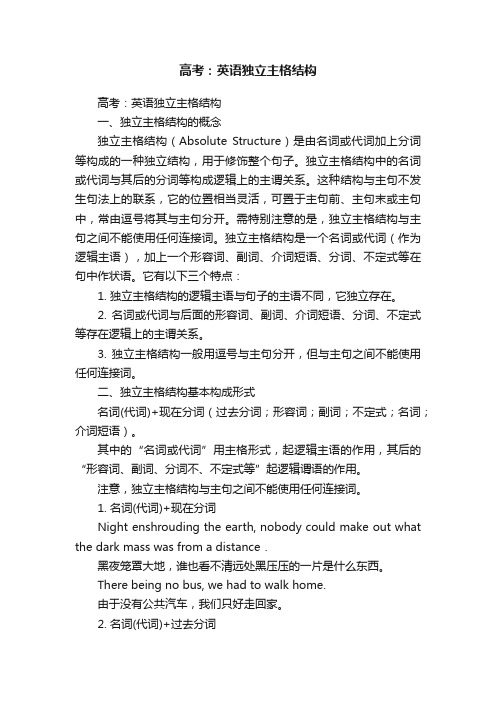
高考:英语独立主格结构高考:英语独立主格结构一、独立主格结构的概念独立主格结构(Absolute Structure)是由名词或代词加上分词等构成的一种独立结构,用于修饰整个句子。
独立主格结构中的名词或代词与其后的分词等构成逻辑上的主谓关系。
这种结构与主句不发生句法上的联系,它的位置相当灵活,可置于主句前、主句末或主句中,常由逗号将其与主句分开。
需特别注意的是,独立主格结构与主句之间不能使用任何连接词。
独立主格结构是一个名词或代词(作为逻辑主语),加上一个形容词、副词、介词短语、分词、不定式等在句中作状语。
它有以下三个特点:1. 独立主格结构的逻辑主语与句子的主语不同,它独立存在。
2. 名词或代词与后面的形容词、副词、介词短语、分词、不定式等存在逻辑上的主谓关系。
3. 独立主格结构一般用逗号与主句分开,但与主句之间不能使用任何连接词。
二、独立主格结构基本构成形式名词(代词)+现在分词(过去分词;形容词;副词;不定式;名词;介词短语)。
其中的“名词或代词”用主格形式,起逻辑主语的作用,其后的“形容词、副词、分词不、不定式等”起逻辑谓语的作用。
注意,独立主格结构与主句之间不能使用任何连接词。
1. 名词(代词)+现在分词Night enshrouding the earth, nobody could make out what the dark mass was from a distance.黑夜笼罩大地,谁也看不清远处黑压压的一片是什么东西。
There being no bus, we had to walk home.由于没有公共汽车,我们只好走回家。
2. 名词(代词)+过去分词The workers worked still harder, their living conditions greatly improved.由于工人们的生活条件大大提高,他们工作得更起劲了。
He was listening attentively in class, his eyes fixed on the blackboard.他上课专心听讲,眼睛紧盯着黑板。
完整版)独立主格结构详细讲解
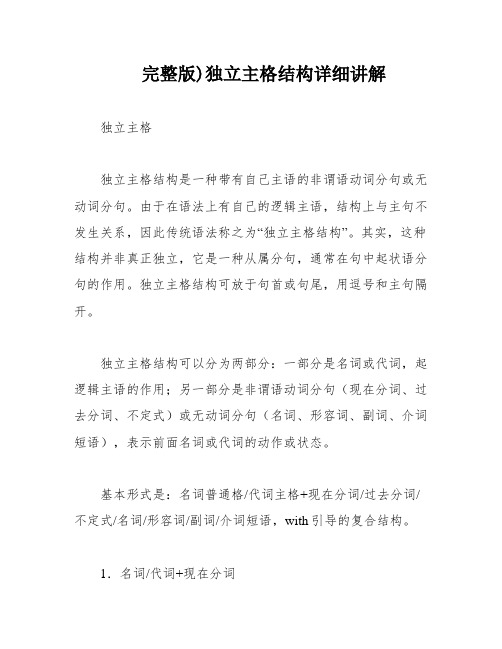
完整版)独立主格结构详细讲解独立主格独立主格结构是一种带有自己主语的非谓语动词分句或无动词分句。
由于在语法上有自己的逻辑主语,结构上与主句不发生关系,因此传统语法称之为“独立主格结构”。
其实,这种结构并非真正独立,它是一种从属分句,通常在句中起状语分句的作用。
独立主格结构可放于句首或句尾,用逗号和主句隔开。
独立主格结构可以分为两部分:一部分是名词或代词,起逻辑主语的作用;另一部分是非谓语动词分句(现在分词、过去分词、不定式)或无动词分句(名词、形容词、副词、介词短语),表示前面名词或代词的动作或状态。
基本形式是:名词普通格/代词主格+现在分词/过去分词/不定式/名词/形容词/副词/介词短语,with引导的复合结构。
1.名词/代词+现在分词现在分词表示前面的名词或代词主动进行的动作或状态等。
例如:The man lay there。
his hands trembling。
So many students being absent。
the meeting had to be put off。
His homework done。
Tom went to sleep。
有时,独立结构中的being或havingbeen可以省去,这样就成了无动词分句或过去分词分句。
2.名词/代词+过去分词过去分词表示前面的名词或代词被动完成的动作或所处的一种状态。
例如:The boy lay on his back。
his hands crossed under his head。
The job not finished。
we couldn’t see the film。
Her shirt caught on a nail。
she could not move。
如果加上havingbeen或being,这些句子就又变成了现在分词分句。
3.名词/代词+不定式不定式表示将来的动作。
例如:XXX going for a ic。
with Mary to provide the food.These are the first two books。
独立主格结构Absolute Structure
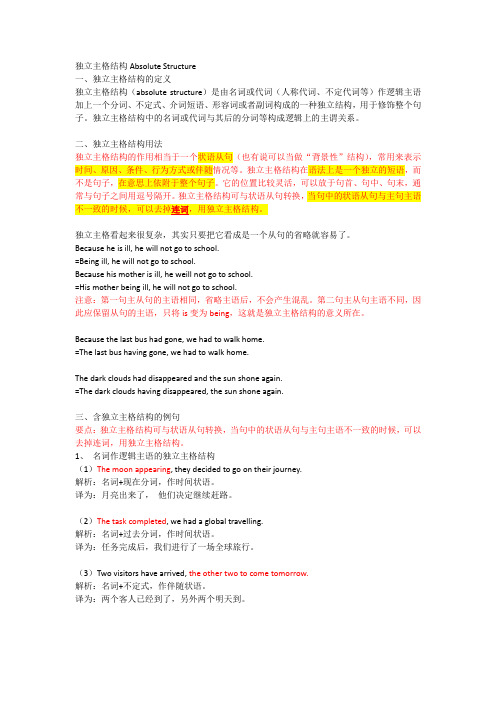
独立主格结构Absolute Structure一、独立主格结构的定义独立主格结构(absolute structure)是由名词或代词(人称代词、不定代词等)作逻辑主语加上一个分词、不定式、介词短语、形容词或者副词构成的一种独立结构,用于修饰整个句子。
独立主格结构中的名词或代词与其后的分词等构成逻辑上的主谓关系。
二、独立主格结构用法独立主格结构的作用相当于一个状语从句(也有说可以当做“背景性”结构),常用来表示时间、原因、条件、行为方式或伴随情况等。
独立主格结构在语法上是一个独立的短语,而不是句子,在意思上依附于整个句子。
它的位置比较灵活,可以放于句首、句中、句末,通常与句子之间用逗号隔开。
独立主格结构可与状语从句转换,当句中的状语从句与主句主语独立主格看起来很复杂,其实只要把它看成是一个从句的省略就容易了。
Because he is ill, he will not go to school.=Being ill, he will not go to school.Because his mother is ill, he weill not go to school.=His mother being ill, he will not go to school.注意:第一句主从句的主语相同,省略主语后,不会产生混乱。
第二句主从句主语不同,因此应保留从句的主语,只将is变为being,这就是独立主格结构的意义所在。
Because the last bus had gone, we had to walk home.=The last bus having gone, we had to walk home.The dark clouds had disappeared and the sun shone again.=The dark clouds having disappeared, the sun shone again.三、含独立主格结构的例句要点:独立主格结构可与状语从句转换,当句中的状语从句与主句主语不一致的时候,可以去掉连词,用独立主格结构。
独立主格结构
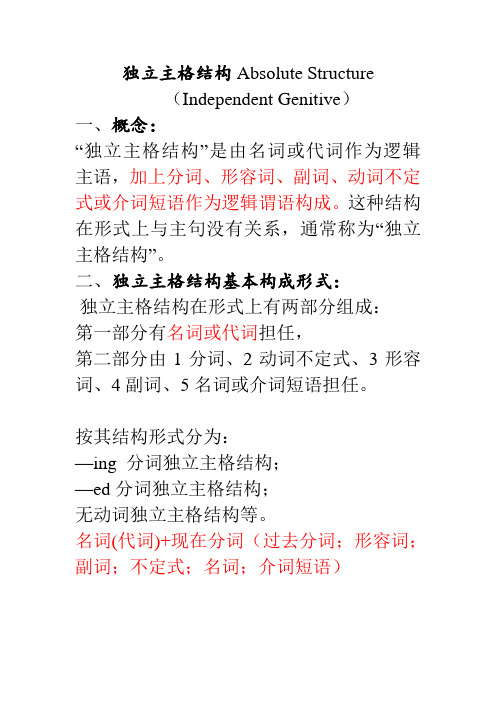
独立主格结构Absolute Structure(Independent Genitive)一、概念:“独立主格结构”是由名词或代词作为逻辑主语,加上分词、形容词、副词、动词不定式或介词短语作为逻辑谓语构成。
这种结构在形式上与主句没有关系,通常称为“独立主格结构”。
二、独立主格结构基本构成形式:独立主格结构在形式上有两部分组成:第一部分有名词或代词担任,第二部分由1分词、2动词不定式、3形容词、4副词、5名词或介词短语担任。
按其结构形式分为:—ing 分词独立主格结构;—ed分词独立主格结构;无动词独立主格结构等。
名词(代词)+现在分词(过去分词;形容词;副词;不定式;名词;介词短语)1. 名词(代词)+现在分词There being no bus, we had to walk home.由于没有公共汽车,我们只好走回家。
2.名词(代词)+过去分词He was listening attentively in class, his eyes fixed on the blackboard.他上课专心听讲,眼睛紧盯着黑板。
3. 名词(代词)+不定式在“名词/代词+动词不定式”结构中,动词不定式和它前面的名词或代词如果存在着逻辑上的主谓关系,动词不定式则用主动的形式;如果是动宾关系,则用被动形式。
He is leaving for the conference next week, all expenses to be paid by his company.他下周去参加一个会议,所有费用由他的公司支付。
We divided the money, he to have half of them .4. 名词(代词)+形容词Computers very small, we can use them widely.电脑虽小,我们却能广泛地利用它们。
5. 名词(代词)+副词The meeting over, our headmaster soon left the meeting room.散会了,校长很快就离开了会议室。
独立主格结构

独立主格结构独立主格结构是由一个相当于主语的名词或代词加上非谓语动词,形容词,副词,或介词短语构成的一种独立成分。
该结构不是句子,也不是从句,所以它内部的动词不能考虑其时态,人称和数的变化,它与其主句之间既不能通过并列连词连接,也不能有从句引导词引导,独立主格结构的位置相当灵活,可置于主句前、末、或句中,常用逗号与其主句隔开。
一、非谓语动词独立主格结构A.不定式结构Such a knife to help you, you will come back soon. 有这样一把刀帮你,你会很快回来的。
B.–ing 形式One day, the mermaids lay in the sea, their eyes looking at the beautiful flowers. 方式状语一天,美人鱼躺在海里,眼睛看着美丽的花。
Two ladies walking towards here, she hid herself into the sea. 原因状语因为两个女子朝这里走过来,她把自己藏在海里。
Time permitting, (条件状语) I will love him forever. 如果时间允许的话,我会永远爱他。
No one noticing, (时间状语) she got to the prince’s ship. 在没有人注意的时候,她来到王子的船上Many eyes watching her, (原因状语) she felt a bit nervous. 很多双眼睛看着她,她觉得有点紧张。
She threw the knife into the sea, her head shaking. 伴随状语她摇着头,把刀扔进了海里There being a ship, (原因状语) he got on it. 因为有一艘船,他上了船It being warm, all the flower bloomed. 因为天气暖和,所有的花都开了。
独立主格结构是什么意思

独立主格结构是什么意思独立主格结构是一种由名词或代词充当句子的谓语的修辞方式,常见于口语中。
独立主格又称之为“联合主格”、“并列结构”、“联合结构”、“分承式”。
这种结构在各类文章中应用较多,如诗歌中的起兴与过渡,散文中的对比、引证等都有它的身影,下面就谈谈其使用时需注意什么:首先要注意位置,一般说来不宜放在开头,因为放在开头难免给人一种孤傲之感;另外也不适宜安排在倒数第二段,因为会给读者一种铺垫不足之感。
当然,如果把它放到末尾那更加不妥了,显得不伦不类。
其次还要看行文思路和结构,根据具体情况作出相应调整。
一篇文章总有一个主题,但无论如何变化都离不开自己内容所形成的主线索,再好的主题,若没有清晰明确的层次脉络,也会让人感觉云里雾里的。
所以写文章最忌讳的便是写流水账,像记流水账似的去叙述自己想要表达的内容。
这样既没有亮点也不能吸引别人阅读下去。
所以,主线索必须十分明确,将你要描绘的景象或人物放到恰当的位置上去,既不可喧宾夺主,也不能画蛇添足。
然后要做好前后呼应的准备,写作之前要做到心中有数,一定要交待好背景知识,还要考虑到全文的逻辑性。
我们平日所接触的写作大多是只写事而忽略了环境的描写,也许你认为这很简单啊!随手拿张纸笔就完事了。
但实际上不是这样的。
光靠一张白纸空话怎么行呢?俗话说“巧妇难为无米之炊”。
缺少材料,写出来的东西自然会枯燥乏味。
你想,如果你打算跟别人谈一件重要的事,你却连他是谁,家住哪里都不知道,人家凭啥跟你聊天,当然,人家找你帮忙你肯定也不乐意。
写作的目的本质上是向读者介绍某些东西,你必须要把握住这个基础,才能继续往深入挖掘。
关于做好前后呼应的工作我有几条建议:①小标题(比如题目)+一个核心句②短句+一个长句③反问+一个陈述④中心句(或起始句)+一个总括句⑤提示句+重复某些字⑥某些内容作为“终止句”⑦开门见山+顺序:从左到右(或从右到左)⑧总分式⑨题目+作者+背景+……。
主要看运用范围和句型,根据具体情况决定。
什么是独立主格结构
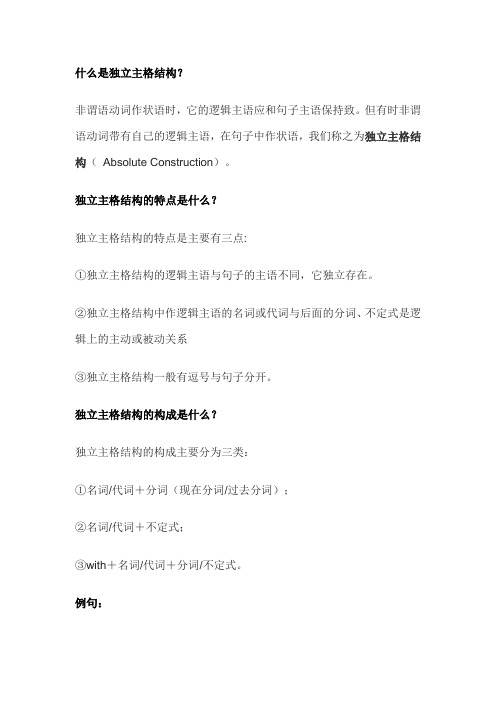
什么是独立主格结构?非谓语动词作状语时,它的逻辑主语应和句子主语保持致。
但有时非谓语动词带有自己的逻辑主语,在句子中作状语,我们称之为独立主格结构(Absolute Construction)。
独立主格结构的特点是什么?独立主格结构的特点是主要有三点:①独立主格结构的逻辑主语与句子的主语不同,它独立存在。
②独立主格结构中作逻辑主语的名词或代词与后面的分词、不定式是逻辑上的主动或被动关系③独立主格结构一般有逗号与句子分开。
独立主格结构的构成是什么?独立主格结构的构成主要分为三类:①名词/代词+分词(现在分词/过去分词);②名词/代词+不定式;③with+名词/代词+分词/不定式。
例句:①The test finished(=When the test was finished),we began our holiday.考试结束了,我们开始放假。
②The president assassinated(=Because the president was assassinated),the whole country was in deep sorrow.总统被暗杀了,全国上下沉浸在悲痛之中。
.[əˈsæsəˌneɪt]③Weather permitting(=If weather permits),we are going to visit you tomorrow.如果天气允许,我们明天打算去看你。
④I stood before her with my heart beating fast.我站在她面前,心脏跳得很快。
练习题:①The party will be held in the garden,weatherA. permittingB. to permitC. permittedD. permit②The children went home from the grammar school,theirlessons___for the day.A.finishingB.finishedC.had finishedD. went finished③The old couple often take a walk after supper in the park with their pet dog____ them.A. to followB. followingC. followedD.follows④I couldn't do my homework with all that noise_____A. going onB. goes onC. went onD. to go⑤The lecture(讲座)____, a lively question--and--answer session followed(跟随; 接着). 尤指法庭、议会等)开庭, 开会A. being givenB. having givenC. to be givenD. having been given答案:A B B A D。
独立主格结构

名词/主格代词+ 名词/主格代词+名词
逻辑主语与后面所跟名词在逻辑上有主谓关系, 逻辑主语与后面所跟名词在逻辑上有主谓关系,表 伴随或进一步补充说明。 伴随或进一步补充说明。
He fought the robber, a stick his only weapon.
There being+名词
There being no buses, they walked to the theatre. There being no c hometown.
The guests having left, he began to take a short rest. All things considered, her paper is of greater value than yours. It being Sunday, I didn’t go to school.
考虑到她喜欢孩子,教书看来是很适合她的工作。 考虑到她喜欢孩子,教书看来是很适合她的工作。
名词/主格代词+ 名词/主格代词+不定式
名词或代词是不定式动作的执行者, 名词或代词是不定式动作的执行者,与不定式构成 逻辑上的主谓关系, 这种结构可位于句末或句首。 逻辑上的主谓关系, 这种结构可位于句末或句首。多表 示将来的行为,表示“企图” 约定” 示将来的行为,表示“企图”、“约定”等,指的是按 计划安排要做的事。 计划安排要做的事。
Taking everything into consideration, they ought to be given another chance.
考虑到各种因素,他们应该得到另一次机会。 考虑到各种因素,他们应该得到另一次机会。
独立主格结构
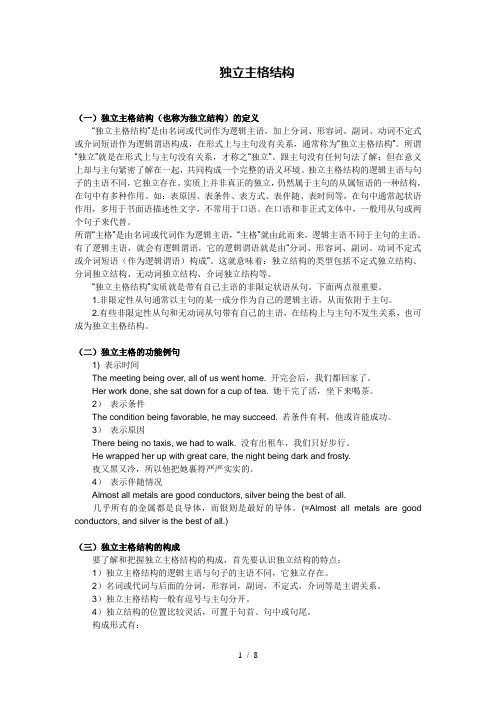
独立主格结构(一)独立主格结构(也称为独立结构)的定义“独立主格结构”是由名词或代词作为逻辑主语,加上分词、形容词、副词、动词不定式或介词短语作为逻辑谓语构成,在形式上与主句没有关系,通常称为“独立主格结构”。
所谓“独立”就是在形式上与主句没有关系,才称之“独立”。
跟主句没有任何句法了解;但在意义上却与主句紧密了解在一起,共同构成一个完整的语义环境。
独立主格结构的逻辑主语与句子的主语不同,它独立存在。
实质上并非真正的独立,仍然属于主句的从属短语的一种结构,在句中有多种作用。
如:表原因、表条件、表方式、表伴随、表时间等,在句中通常起状语作用,多用于书面语描述性文字,不常用于口语。
在口语和非正式文体中,一般用从句或两个句子来代替。
所谓“主格”是由名词或代词作为逻辑主语,“主格”就由此而来,逻辑主语不同于主句的主语。
有了逻辑主语,就会有逻辑谓语,它的逻辑谓语就是由“分词、形容词、副词、动词不定式或介词短语(作为逻辑谓语)构成”。
这就意味着:独立结构的类型包括不定式独立结构、分词独立结构、无动词独立结构、介词独立结构等。
“独立主格结构”实质就是带有自己主语的非限定状语从句。
下面两点很重要。
1.非限定性从句通常以主句的某一成分作为自己的逻辑主语,从而依附于主句。
2.有些非限定性从句和无动词从句带有自己的主语,在结构上与主句不发生关系,也可成为独立主格结构。
(二)独立主格的功能例句1) 表示时间The meeting being over, all of us went home. 开完会后,我们都回家了。
Her work done, she sat down for a cup of tea. 她干完了活,坐下来喝茶。
2)表示条件The condition being favorable, he may succeed. 若条件有利,他或许能成功。
3)表示原因There being no taxis, we had to walk. 没有出租车,我们只好步行。
独立主格结构

独立主格结构独立结构在形式上与主句没有关系,游离于句子主体之外,跟主句没有任何句法联系,但在意义上与主句联系在一起,共同构成一个完整的语境。
特点: 1. 独立主格结构的逻辑主语与句子的主语不同, 它独立存在.2. 名词或代词与后面的分词,不定式,形容词,介词短语等是主谓关系。
3. 独立主格结构可置于句子前,末或句中,用逗号与主句分开。
4. 独立主格结构与句子之间不能使用任何连词,(包括分号)。
一、独立主格结构的常见结构1. 名词(代词)+ 现在分词:Weather permitting, we’ll go outing tomorrow.2. 名词(代词)+ 过去分词:He lay on his back, his hands crossed under his head.3. 名词(代词)+ 形容词:She came into the room, her ears red with cold.4. 名词(代词)+ 不定式:Here are the first two volumes, the third one to come out next month.5. 名词(代词)+ 介词短语:He walked out of the camp, rifle in hand.(= with a rifle in his hand.)二、独立主格结构在句中的作用:时间状语:The test finished, we began our holiday. = When the test was finished, …….条件状语:Weather permitting, we’ll go outing tomorrow. = If weather permits, ……..原因状语:The storm drawing near, the workers decided to stop working. = Since the storm was drawing near, …….伴随状语:He sat in the front row, his mouth half open. = He sat in the front row and his mouth was half open.三、WITH结构1. with+ 宾语+ 现在分词(表示正在发生或发生了的动作)With the boy leading the way, we found his home easily.2. with+ 宾语+ 过去分词(表示被动或完成)He stood silently, with his eyes fixed on the screen.3. with+ 宾语+ 不定式(表示将要发生的动作)With so much homework to do, I can’t go to the party tonight.4. with+ 宾语+ 介词短语With his wife out of temper, he decided to stay at home.5.with+ 宾语+ 形容词She came into the room, her ears red with cold.典型例题:1. The teacher came into the classroom, _________.A. a book in handB. book in his handC. book in handD. a book in his hand2. The sale usually takes place outside the house, with the audience ________ on the benches, chairs or boxes.A. having seatedB. seatingC. seatedD. having been seated3. Without the sun’s light _______ the earth’s surface, it would be so cold that life could not exist on earth.A. warmsB. warmedC. warmingD. to warm4.________, a man who expresses himself effectively is sure to succeed more rapidly than a man whose command of language is poor.A. Other things being equalB. Were other things equalC. To be equal to other thingsD. Other things to be equal5.All flights ________ because of the snowstorm, many passengers could do nothing but take the train.A. had been canceledB. have been canceledC. were canceledD. having been canceled6.All the tasks _______ ahead of time, they decided to go on holiday for a week. been fulfilled B. having been fulfilled C. were fulfilledD. had been fulfilled.7.A new technique _______, the production increased by 20 percent.A. to have been worked outB. having worked outC. working outD. having been worked out8._______, everything has changed.A. Time goes onB. Time going onC. As time going onD. With time went on四、独立主格结构与独立成分的异同:1. 有的分词短语可以独立存在,在句子中没有逻辑上的主语,实际已成为习惯短语。
独立主格结构

如果明天天气好的话, 我们要去郊游。
5. 表示结果 The battle ended with the enemy defeated. 战斗结束了, 敌人被打败了。 They have finished the peace talks with the agreements reached. 他们结束了和谈, 达成了协议。
He came into the room, his ears
red with cold.
He came out of the library, a large
book under his arm.
Ⅲ. 独立主格的构成
独立主格结构的构成方式:名词普通 格式或代词主格+现在分词/过去分词/ 不定式/名词/形容词/副词/介词短语等
注意: 1) 独立主格结构使用介词的问题: 当介词是in时, 其前后的两个名词均不 加任何成分(如物主代词或冠词), 也不用 复数。但 with 的复合结构不受此限制。
A robber burst into the room, knife
in hand. (hand前不能加his)。
2) 当表人体部位的词做逻辑主语时, 及物动词用现在分词, 不及物动词用 过去分词。
3. with + 宾语 + 副词 The girl fell asleep with the light on. 那位女孩睡着了, 灯还亮着。 Her mother sat in an armchair with her head down. 她母亲坐在椅子上, 头低着。 4. with +宾语 +不定式 I can’t go out with these clothes to wash. 因为这些衣服要洗, 我不能出去。 I had to go to bed with nothing to do. 我没有事可做, 只好睡觉。
独立主格8种结构
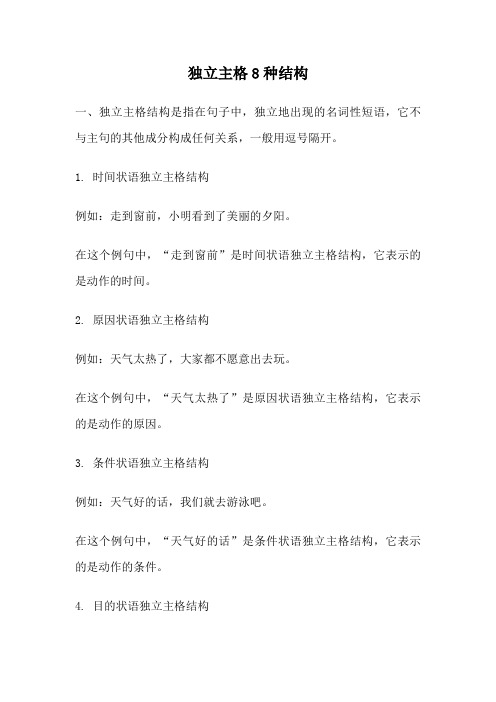
独立主格8种结构一、独立主格结构是指在句子中,独立地出现的名词性短语,它不与主句的其他成分构成任何关系,一般用逗号隔开。
1. 时间状语独立主格结构例如:走到窗前,小明看到了美丽的夕阳。
在这个例句中,“走到窗前”是时间状语独立主格结构,它表示的是动作的时间。
2. 原因状语独立主格结构例如:天气太热了,大家都不愿意出去玩。
在这个例句中,“天气太热了”是原因状语独立主格结构,它表示的是动作的原因。
3. 条件状语独立主格结构例如:天气好的话,我们就去游泳吧。
在这个例句中,“天气好的话”是条件状语独立主格结构,它表示的是动作的条件。
4. 目的状语独立主格结构例如:为了赚钱,他每天都加班到很晚。
在这个例句中,“为了赚钱”是目的状语独立主格结构,它表示的是动作的目的。
5. 结果状语独立主格结构例如:他学习非常努力,成绩自然会提高。
在这个例句中,“他学习非常努力”是结果状语独立主格结构,它表示的是动作的结果。
6. 让步状语独立主格结构例如:尽管天气很冷,他还是坚持锻炼。
在这个例句中,“尽管天气很冷”是让步状语独立主格结构,它表示的是动作的让步条件。
7. 方式状语独立主格结构例如:他边听音乐,边做作业。
在这个例句中,“边听音乐”是方式状语独立主格结构,它表示的是动作的方式。
8. 伴随状语独立主格结构例如:他一边吃饭,一边看电视。
在这个例句中,“一边吃饭”是伴随状语独立主格结构,它表示的是动作的伴随状态。
通过以上的例子,我们可以看出独立主格结构的灵活运用能够使得句子更加丰富多样,表达更加准确清晰。
熟练掌握这些结构,能够让我们的写作更加生动有趣,同时也能提高我们的语言表达能力。
所以,在写作中,我们应该多加运用独立主格结构,让我们的句子更加地道、准确。
独立主格结构
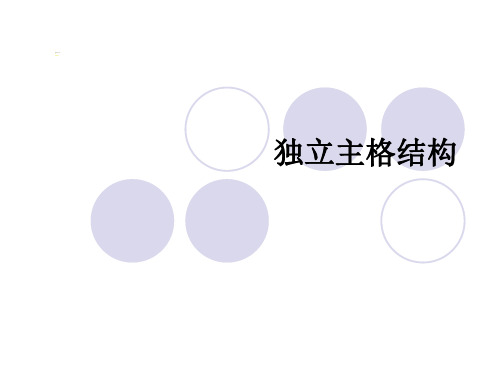
独立主格结构
一、独立主格结构的概念
独立主格结构(Absolute Structure)是由名词或 代词加上分词等构成的一种独立结构,用于修饰 整个句子。独立主格结构中的名词或代词与其后 的分词等构成逻辑上的主谓关系。这种结构与主 句不发生句法上的联系,它的位置相当灵活,可 置于主句前、主句末或主句中,常由逗号将其与 主句分开。在句中作状语,相当于一个状语从句。
由那个男孩带路,我们很容易就找到了那 奇怪的洞。
There being no further business to discuss, we all went home.
没有别的事可讨论,我们都回家了。
4. 作伴随状语或补充说明
例:Ten students entered for the competition, the youngest a boy of 12.
The storm drawing near在句中作: 原因状语
=Since the storm was drawing near,the navvy decided to call it a day.
由于暴风雨即将来临,那个挖土小工决定收工。 (call it a day 今天到此为止)
例句:Winter coming, it gets colder and colder.
work.
6. 名词(代词)+名词 例:His first shot failure,he fired again. 他第一枪没击中,又打了一枪。
A lot of people all over the world are fans of iPhone, many of them Chinese .
独立主格结构
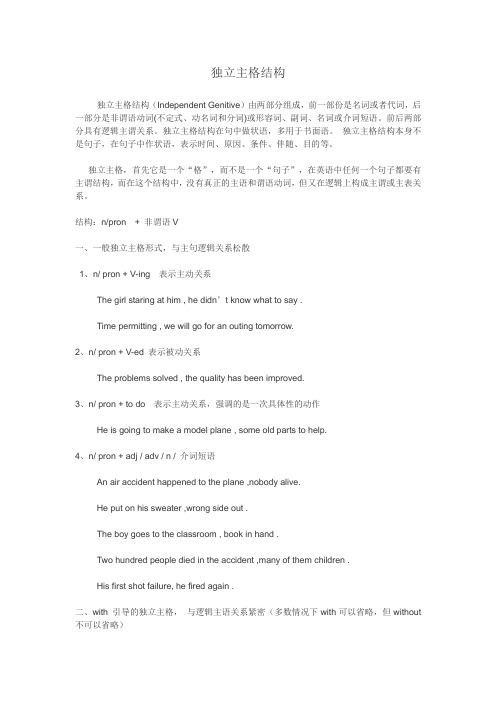
独立主格结构独立主格结构(Independent Genitive)由两部分组成,前一部份是名词或者代词,后一部分是非谓语动词(不定式、动名词和分词)或形容词、副词、名词或介词短语。
前后两部分具有逻辑主谓关系。
独立主格结构在句中做状语,多用于书面语。
独立主格结构本身不是句子,在句子中作状语,表示时间、原因、条件、伴随、目的等。
独立主格,首先它是一个“格”,而不是一个“句子”,在英语中任何一个句子都要有主谓结构,而在这个结构中,没有真正的主语和谓语动词,但又在逻辑上构成主谓或主表关系。
结构:n/pron + 非谓语V一、一般独立主格形式,与主句逻辑关系松散1、n/ pron + V-ing 表示主动关系The girl staring at him , he didn’t know what to say .Time permitting , we will go for an outing tomorrow.2、n/ pron + V-ed 表示被动关系The problems solved , the quality has been improved.3、n/ pron + to do 表示主动关系,强调的是一次具体性的动作He is going to make a model plane , some old parts to help.4、n/ pron + adj / adv / n / 介词短语An air accident happened to the plane ,nobody alive.He put on his sweater ,wrong side out .The boy goes to the classroom , book in hand .Two hundred people died in the accident ,many of them children .His first shot failure, he fired again .二、with 引导的独立主格,与逻辑主语关系紧密(多数情况下with可以省略,但without 不可以省略)结构:With(without) +宾语(n/ pron) + 宾语补足语(V-ed / V-ing / adj / 介词短语)Without a word more spoken , she left the meeting room .三、each引导的强调型独立主格句子+ n(复数结尾),each + 介词短语/ 形容词短语/ 名词短语/ V-ing / V-ed形式,这种结构为了强调句尾的名词(复数)Under the restructuring, the huge organization that operates the company's basic businesses will be divided into five groups, each with its own executive。
独立主格结构

七、非谓语动词独立主格结构 在独立主格结构中,非谓语动词和它前 面的名词或代词存在着逻辑上的主谓关系。 Such an able man to help you,you will surely succeed sooner or later. 有这么能干的人来帮你, 你迟早一定会成功 的。(such an able man和 to help you 之间 存在着主谓关系) = Since such an able man will help you, you will surely succeed sooner or later.
五、独立主格结构与分词短语作状语的异同: 1、独立主格结构与分词短语都可以转化成状语从句。 但是,独立主格结构转换成状语从句后,有自己的逻 辑主语,与主句的主语不一致;而分词短语转化为状 语从句后,从句的主语与主句的主语相同。例: ⑴ If time permits, we’d better have a rest at this weekend. -→Time permitting,we’d better have a rest at this weekend. 如果时间允许,本周末我们最好休息一下。 ⑵ When we see from the top floor, we can find the garden more beautiful. -→Seeing from the top floor, we can find the garden more beautiful. 从顶楼上看,花园更漂亮。
1.表示时间的-ing形式作“独立主格结 构” Everyone being ready, the teacher began his class. 每个人都准备好后,老师开始上课。 (相当于一个时间状语从句When everyone was ready) The chairman began the meeting , everyone being seated. 每个人坐好后,主席开始开会。 (相当于一个时间状语从句after everyone was seated)
- 1、下载文档前请自行甄别文档内容的完整性,平台不提供额外的编辑、内容补充、找答案等附加服务。
- 2、"仅部分预览"的文档,不可在线预览部分如存在完整性等问题,可反馈申请退款(可完整预览的文档不适用该条件!)。
- 3、如文档侵犯您的权益,请联系客服反馈,我们会尽快为您处理(人工客服工作时间:9:00-18:30)。
独立主格结构概念:由名词或代词加上分词等构成的一种独立结构,名词或代词与其后的分词等构成逻辑上的主谓关系,与主句不发生句法上的联系。
构成:逻辑主语+逻辑谓语特点:1. 用逗号与主句分开;2. 逻辑主语与主句主语不同,单独存在。
位置:句前、句末或句中,位置相当灵活。
注意:独立主格结构与句子之间不能使用任何连接词句法功能:1.作时间状语All the officials having arrived, the meeting was declared open. = After/ when all the officials hadarrived, the meeting was declared open.2.作条件状语All the work done, you can have a rest. = All the work is done, and you can have a rest.3.作原因状语The boy leading, we had no trouble finding the strange cave4.作伴随状语或补充说明I took my ticket, and marched proudly up the platform, with my cheeses, the peoplefilling back respectfully on either side. (Three Men in a Boat by Jerome K. Jerome)5.作定语,其功能相对于一个定语从句Close to the bank I saw deep pools, the water blue like the sky.基本结构:1. 名词(代词)+现在分词e.g.: There being no bus, we had to walk home.(由于没有公共汽车,我们只好走路回家。
)2. 名词(代词)+过去分词e.g.: City born and city bred, I have always regards the country as something you look at through a train window, or something you occasional visit during the week.3. 名词(代词)+不定式e.g.: Many trees, flowers, and glass to be planted, out newly-built school will look even more beautiful.(种上许多的树、花和草后,我们新建的学校看上去将更美。
)4. 名词(代词)+形容词e.g.: The Trojans asleep, the Greek soldiers crept out of the hollow wooden horse.(特洛伊人睡着了,于是希腊士兵从中空的木马里面悄悄爬了出来。
)5. 名词(代词)+副词e.g.: The lights off, we could not go on with the work.(灯熄了,我们不能继续工作了。
)6. 名词(代词)+名词e.g.: His first shot failure, he fired again.(他第一枪没击中,又打了一枪。
)7. 名词(代词)+介词短语e.g.: He lay at full length upon his stomach, his head resting upon his left forearm.(他的背脊朝天,四肢伸展,头枕着左臂,直挺挺地趴伏着。
)8. with, without 引导:with/ without + 宾语(名词/ 代词)+ 宾语补足语e.g.:He stood at the door, with a book in hand. / He stood at the door, book in hand.(他站在门口,手里拿着一部电脑。
)Without a word more spoken, she left the classroom.(她没再说什么话就离开了会议室。
)$$: 在with/ without复合结构中,多数情况下with可以省略,但without 不能省。
9. There be句型表存在e.g.: There being nothing to do, we decided to stay at home.翻译练习:1. 由于丢了自行车钥匙,他只好步行回学校。
2. 我收到很多礼物,其中很多是玩具。
3. 因为是周末,我们不要上课。
4. 他上课专心听讲,眼睛紧盯着黑板。
5. 他把自己的手机藏起来,没有人知道它在哪里。
句子转换1、转换成状语从句a. His homework done, he went to bed.b. She not feeling well, we worried about her.c. Weather permitting, the sports meet will be held the day after tomorrow.2、转换成并列句d. The young woman came into the cinema, a baby in her arms..e. The boy stood there silently, his eyes fixed upon the black people.3、转换成“with”的复合结构f. Night falling, we hurried home.g. The signal given, the train left the railway station.h. The old scientist came to the meeting, his wife supporting him.i. The spy sat on the ground, his hands tied behind his back.五、独立主格结构注意事项1. 独立主格结构多用于书面语,尤其是描述性语言中,在口语和非正式文体中,一般用从句或两个句子来代替。
独立主格结构的逻辑主语与句子的主语不同,它独立存在,名词或代词与后面的分词等逻辑上是主谓关系,独立主格结构一般有逗号与主句分开。
The president assassinated, the whole country was in deep sorrow.总统被谋杀了,举国上下沉浸在悲哀之中。
2. 动词不定式表示动作没有发生或即将发生,动词-ed形式表示动作已经结束,动词-ing形式往往表示动作正在进行。
The manager looks worried,many things to settle.经理看上去很着急, 有这么多的事情要处理。
(事情还没有处理,而且是由经理本人来处理,用不定式to settle,表示将来的时间)The manager looks relaxed, many things settled.许多事情已经处理好了,经理看上去很轻松。
(事情已经处理好了,用过去分词settled表示动作已经结束)The food being cooked, the boy was watching TV.小孩一边做饭,一边看电视。
(两个动作同时进行)3. 独立主格结构介词使用的问题当介词是in时,其前后的两个名词均不加任何成分(如物主代词或冠词),也不用复数。
但with 的复合结构不受此限制。
A robber burst into the room, knife in hand. ( hand前不能加his)劫匪手里拿着刀闯进房间。
当表人体部位的词做逻辑主语时,及物动词用现在分词,不及物动词用过去分词。
He lay there, his teeth set, his hands clenched, his eyes looking straight up.他躺在那儿,牙关紧闭,双拳紧握,两眼直视上方。
4. 独立主格结构与独立成分的异同有些分词短语可以独立存在,在句子中没有逻辑上的主语,作为习惯用法。
这些短语有:Generally speaking (总的说来),Frankly speaking (坦率地说),Judging from (从……判断),Supposing (假设),等等。
Generally speaking, the rule is very easy to understand.总的说来,这条规则很容易懂。
Judging from what he said, he must be an honest man.由他所说的来判断,他一定是一个诚实的人。
有些固定短语是带to 的不定式,表明说话人的立场或态度,在句中作独立成分。
这些短语有:to be honest(老实说),to be sure (确实),to tell you the truth (说实话),to cut a long story short (长话短说),to be frank (坦率地说),to make matters / things worse (更糟糕的是),等等。
To tell you the truth, I made a mistake in the word spelling.说实话,我犯了一个拼写错误。
To make things worse, many of the men have gone off to cities in search of higher pay, leaving women from nearby villages to carry on with the work.情况更糟的是,许多男人都去城市找工资较高的工作,而留下附近村庄的妇女来继续承担修复工作。
5.独立主格结构与分词短语都可以转换为状语从句。
但是独立主格结构转换为状语从句后,它有自己的逻辑主语,与主句的主语不一致;而分词短语转换为状语从句后,从句的主语与主句的主语一致。
If time permits, we'd better have a holiday at weekends.转换为:Time permitting, we'd better have a holiday at weekends.如果时间允许,我们最好周末去度假。
When we see from the hilltop, we can find the city more beautiful.转换为:Seeing from the hilltop, we can find the city more beautiful.从山顶上看,我们发现这个城市更美了。
